Over the Years
Home > Over the Years > Over the Fiscal Years (2010 APR - 2020 MAR) > Six Nurses from Korea, Invited for Training
Six Nurses from Korea, Invited for Training
HICARE invited six nurses from Korean hospitals affiliated to the Korean Red Cross that provide medical care for radiation-exposure victims, for training on the treatment of radiation disorders.
Names and Titles of Trainees:
Ok-Yeob PORK
Head Nurse, Emergency Medicine Department
Gyeongsang National University Hospital
Sen-Im CHOI
Head Nurse, Nursing Division
Kyunghee University Medical Center
Mi-Kyung JUNG
Head Nurse, Nursing Department
Incheon Redcross Hospital
Mi-Young JUNG
Registered Nurse, Radiation Oncology
Young-Nam University Hospital
So-Yun JUNG
Nurse, Department of Nursing
Sangju Red Cross Hospital
Eun-Sil SHIN
Nurse, Nursing Department
Busan Medical Center
Period of Training:
November 26 to 30, 2012
Training Organizations (in order of visits):
Radiation Effects Research Foundation
Hiroshima University Hospital (Department of Radiation Oncology)
Kurakake Nozomi-en (A-bomb survivors nursing home)
Hiroshima University Hospital (Advanced Emergency and Critical Care Center)
Hiroshima Atomic Bomb Casualty Council
Hiroshima Red Cross Hospital & Atomic-bomb Survivors Hospital
Hiroshima Peace Memorial Museum and others
Training Course:
Diagnosis of radiation disorders
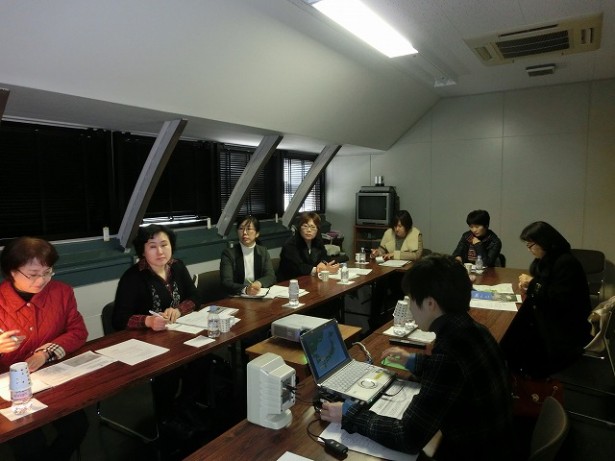
Training session at Radiation Effects Research Foundation
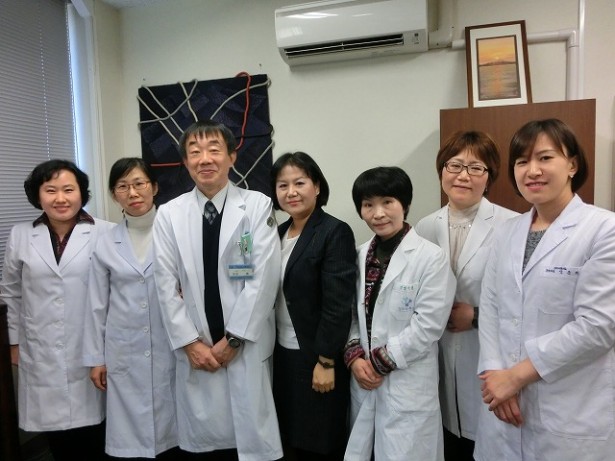
With Professor Yasushi Nagata of Department of Radiation Oncology, Hiroshima University Hospital (3rd from left)
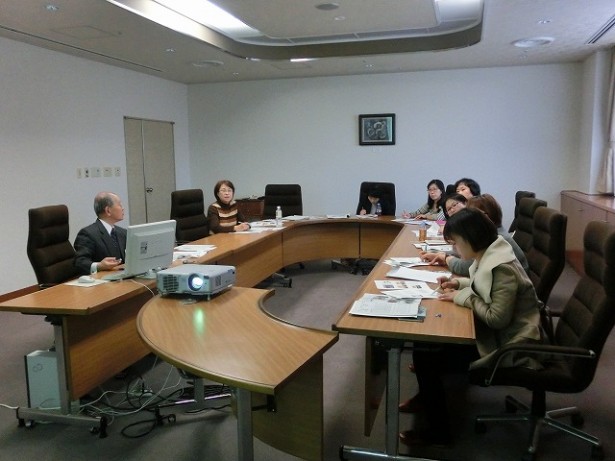
Lecture scene of Dr. Nanao Kamada, Board Chairman of Hiroshima A-Bomb Survivors Relief Foundation (far left)
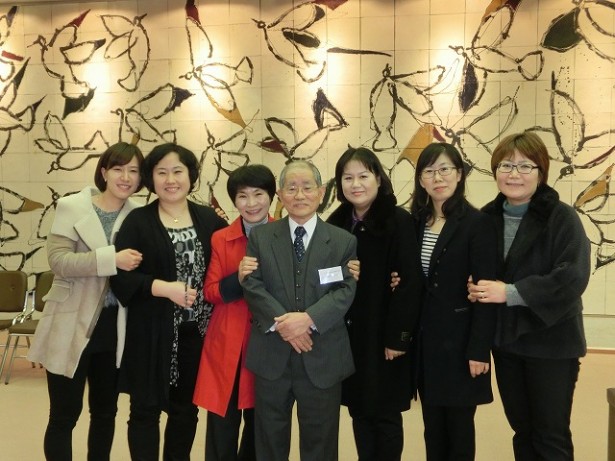
With Dr. Nanao Kamada (center)
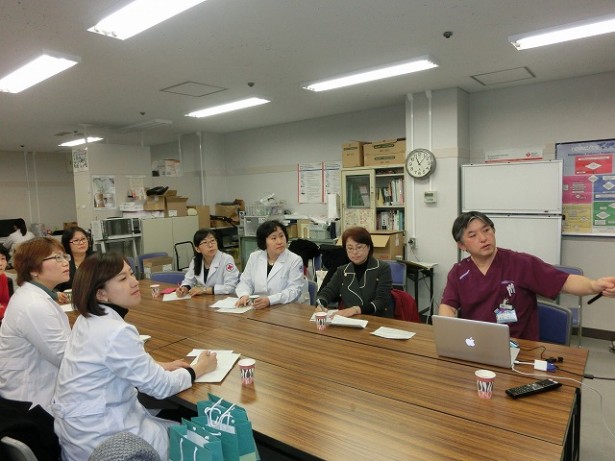
With Associate Professor Nobuyuki Hirohashi, Advanced Emergency and Critical Care Center of Hiroshima University Hospital (far right)
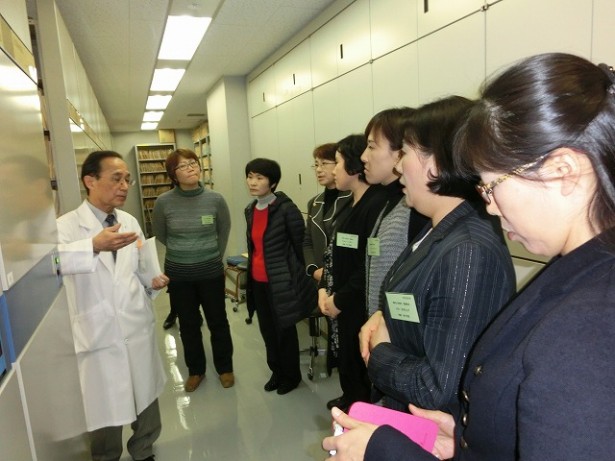
With Dr. Hideo Sasaki, Director of Health Management & Promotion Center, Hiroshima Atomic Bomb Casualty Council (far left)
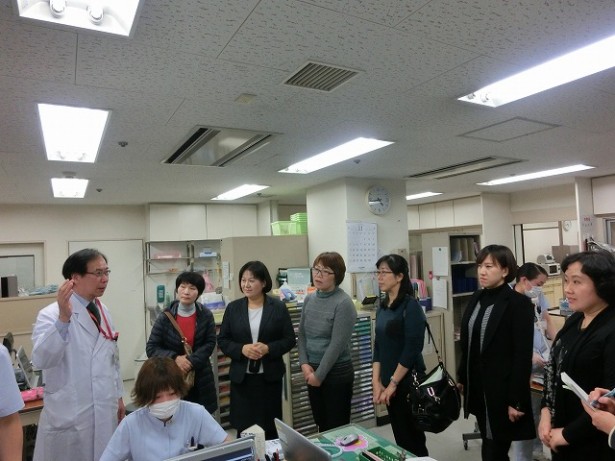
With Dr. Kenichi Arita, Director of Department of Respiratory Disease of Hiroshima Red Cross Hospital & Atomic-bomb Survivors Hospital (far left)
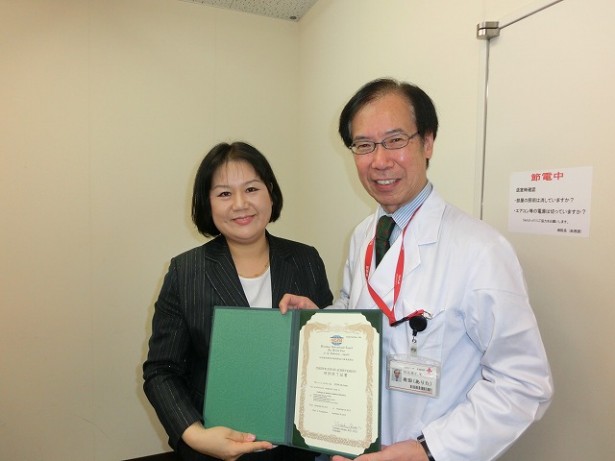
Ms. Pork (left) receiving a certificate of completion by Dr. Kenichi Arita
Feedback:
◆I learned that the management system for A-bomb survivors is well-prepared. When I go back to Korea, I will spread the word about what I learned about A-bombing. The kindness and consideration the institutions we visited extended to us gave me an opportunity to examine myself and I felt that I always want to be a sympathetic supervisor and a colleague for our hospital people.
I wish I could have met with A-bomb survivors to talk with them directly.
◆HICARE Training made me learn about A-bomb survivors in Hiroshima and their relief plans. It was very significant for me to visit the A-bomb survivors’ nursing home and observe radiotherapy at Hiroshima University Hospital. I also learned about the after-effects of A-bombing.
I will take back what I learned to educate our hospital staff. I am extremely grateful to all the doctors who earnestly lectured us.
◆Through the HICARE Training I got to understand more about A-bombing. I will share the information I gained with people around me at home and will give more consideration to the survivors living in Korea.
At the A-bomb survivors’ nursing home I saw systematic management and tailored support for each resident which made me realize that we have to try harder at our own workplace.
I was also impressed with the Japanese Government’s devotion to the support, research and study of the A-bomb survivors’ lives.
◆I learned about the power and effects of radiation and sorrow of A-bomb victims. I sympathize, from the bottom of my heart, with Hiroshima appealing for realizing a world free of nuclear weapons and for world peace. I was impressed with the robust spirit of the Japanese people who did not give up in the ruins after the A-bombing and re-built their city. They now even utilize their world’s best knowledge on the effects of radiation for contribution to the rest of the world.
◆After I saw the tragic photos and materials about the A-bombing I strongly felt the importance of peace. I was also impressed with the government which has been steadily making efforts for management and support of A-bomb survivors for a long period of time. With the knowledge I learned in the training I believe I will be kinder and more sympathetic to the A-bomb survivors when they visit our hospital in Korea.
Hiroshima is such a beautiful and quiet city, which you could never imagine to have had an A-bomb dropped over it. This is due entirely to the efforts of the citizens.
◆I learned about the significance of knowing and dealing with the situation when A-bombed and follow-up management, study, and research. I was impressed that that management and research has been conducted consistently throughout. I had a precious opportunity to learn about the pain and fear of the A-bomb victims. Though we could watch the testimony movies of the survivors I wish I could have been able to meet with the survivors to ask questions and to know more about their feelings.
I found the management system and various programs at the A-bomb survivors’ nursing home seems to be very useful to my section in the hospital, so I will try to apply some back home.
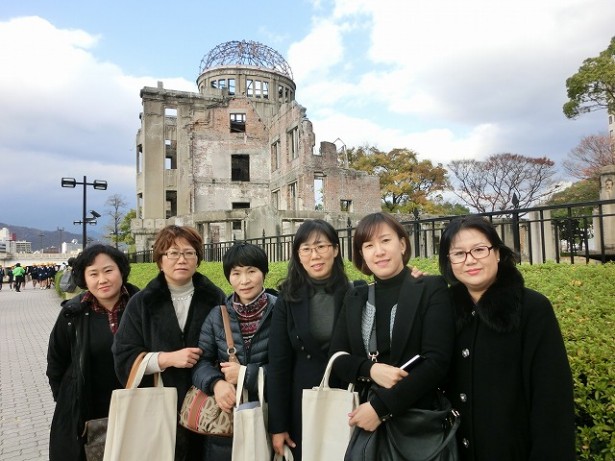
A-bomb Dome in the background




